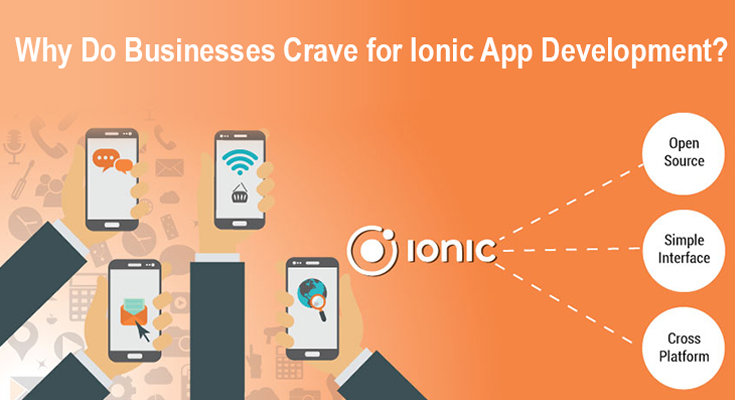Undoubtedly, an app is the most feasible asset to propagate a business idea that takes a dynamic form bypassing various crucial stages of mobile app development. An app occupies huge potential to develop a wide range of audiences while keeping intact all the essentials of app creation.
There has been a comparison between hybrid and native apps for quite a long time and with the advent of new app development frameworks, they both have entered a new phase that is capable of bringing disruptive changes in the mobile app industry.
User experience, design, and themes, layouts, are the obligatory elements of an app that can be better embedded and enhanced using one of the top frameworks in use, that is, Ionic Framework.
Ionic is an open-source technological framework used in the development of hybrid mobile applications. By combining the HTML, CSS, and Javascript code, we obtain applications with a friendly and intuitive interface for the user.
And not to forget, the most amazing element is developing a single code, it facilitates creating apps for both Android or iOS.
A Quick View of Ionic’s History
The ionic framework is built on AngularJS and Cordova. It was born in 2013 with a sole aim to facilitate the developers to create hybrid mobile applications with the benefits of the two mentioned frameworks.
One of the major advantages of working with Ionic is that it takes advantage of Cordova’s plugins (handling of hardware, software, images, text, QR codes, etc.). In 2016, it was updated to the Ionic 2 version, with modularization, one of the most complete updates of this framework, allowing it to be separated into parts: core, angular, native.
The Ionic 3 update is practically imperceptible in terms of new functionalities, although it does bring new features in its performance.
Continuing with the development and upgraded tools, in version 4, it begins by replacing Angular JS with modern Angular. The component set of this tool uses custom elements the shadow DOM APIs, available in all modern desktop and mobile browsers.
Another novelty that Ionic 4 brings is that it allows to use React, Vue, Angular, or Javascript for the development of programming logic.
Ionic 5, recently launched on 2/11/2020, arrived announcing these improvements on its page where this version includes iOS 13 design updates, a new API to create your own custom animations, renewed Ionicons, updated ionic colors, new initial designs, improvements in the customization of components and more.
With all these accounting features it has become easier to expose the native functionality to the web application in a cross-platform way. The development of mobile applications with Ionic guarantees that the implementation of the project is much more stable, simple, and with an optimal user interface.
App development with Ionic is mostly the preferred choice and also a recommended option for almost all the startups who seek to build interesting and intriguing applications built with an intention to develop a strong business base and business growth.
[Prefer Reading: “10 Unforgivable Mobile App Development Basics Mistakes Everyone Makes.”]
Why Opt for Ionic App Development?
Today, cross-platform app development has taken all the hype, and frameworks considered best for the same are Ionic and PhoneGap. Out of the two Ionic is the most likely chosen framework for creating native and progressive web apps through a web platform.
Let’s check out some more benefits that Ionic tends to bestow upon us:
#1 Native App Creation, Feasibly Possible
The wish of startups to develop a budget-friendly native app is granted by the holistic framework of Ionic which is no less than an extraordinary trait. Ionic either can provide Ionic’s native plugin ecosystem or can lend an aid through the native wrapper.
Developers can target potential audiences with ease and can readily build native apps for any operating system.
#2 Single App, Double Platforms
Simply put, a single app developed in Ionic can serve the users of both Android and iOS. The rising concerns here are only focussed upon the mobile app development cost for SMEs as it will tend to cover a huge monetary value as unexpected.
Even though the app budget is a heating concern, Ionic business apps prove to be seamlessly beneficial in spreading business reach.
#3 Flawless Functionality Offered
Performance and productivity go hand in hand when we talk about ionic app development. The platform ensures seamless app performance across different platforms.
Ionic builds powerful apps that can stand out in the app development race and win it, grabbing user praise. Companies can migrate their existing apps (native/hybrid) to the Ionic framework.
#4 Minimal Development Time
One of the important factors that fuel the race of competition is rendering apps with reduced TTM (Time to Market). This is where the framework gives an upper hand to developers to create intuitive applications in the shortest interval of time, rendering everything necessary to compact the development time.
#5 Innovation with Result
Developing an app with embedded necessary features and launching it doesn’t end the role. In today’s materialistic world of trade, a business must know how to maintain an innovative approach after its inception.
Innovative, Intriguing, Interesting, Interactive are the four necessary abstract values a digital app must possess to distinguish itself from the rest. Fortunately, the Ionic App flow certainly helps you derive innovation out of your development efforts by managing the entire app lifecycle with ease and flexibility.
#6 Startup-Ready Framework
While limiting the troubles of developers, Ionic framework for mobile app development is an ideal solution for delivering the essence of customization and personalization in the mobile apps, thus, taking user experience to the next level.
As said earlier that Ionic is a recommended option for SMEs, I won’t be hesitant to say that it is a one-stop-platform for budding businesses to connect with the right audience with the right apps, available to develop at instant disposal.
Ionic framework is capable of providing all the desired features, keeping limitations at bay. Take a look at some of its offerings:
– UI patterns for M-commerce apps like Tab bar, Side Nav, etc.
– Different Cordova Plugins
– ToDo and User Registration Features
– Ionic 4 Service can communicate with a REST API
[Prefer Reading: “Frameworks for Developing Hybrid Mobile Apps.”]
#7 Easy Adoption
Developers having sound knowledge of CSS, JavaScript, HTML can assume learning and developing in Ionic as a cakewalk. Development companies can leverage Ionic and acquire expected results if their business requirements are inclined towards hybrid app development.
#8 High-End Performance Delivered
Ionic combined with native app code in PhoneGap delivers far better performance as well as productivity than hybrid applications. Ionic uses the power of AngularJS for hardware acceleration and CSS transitions are put to use for enhancing the GPU and maximizing the processor time.
[Prefer Reading: “Top Cross-Platform Mobile Frameworks’ Comparison: React Native vs Xamarin vs Flutter.”]
The Wrap Up
If you ask which is the best framework for developing a business app, then truly there is no good or bad, it’s just some fulfill their motive successfully and others possess some flaws for which they are neglected.
All the platforms, frameworks, or tools are just tailored to solve specific tasks and are intended to simplify human activities. And, if we say who among them leads, then being the most preferred choice Ionic tops by solving many development sprees across various platforms, utilizing technologies at their best.
[Note: With all that said, the decisions are made on priorities that dictate one’s choice]
If you are looking for experienced professionals, holding expertise in AngularJS, and who are well-versed with JavaScript, reach out On-demand and Dedicated software developers of NetSet Software who can help you develop your high-performing dream applications.



